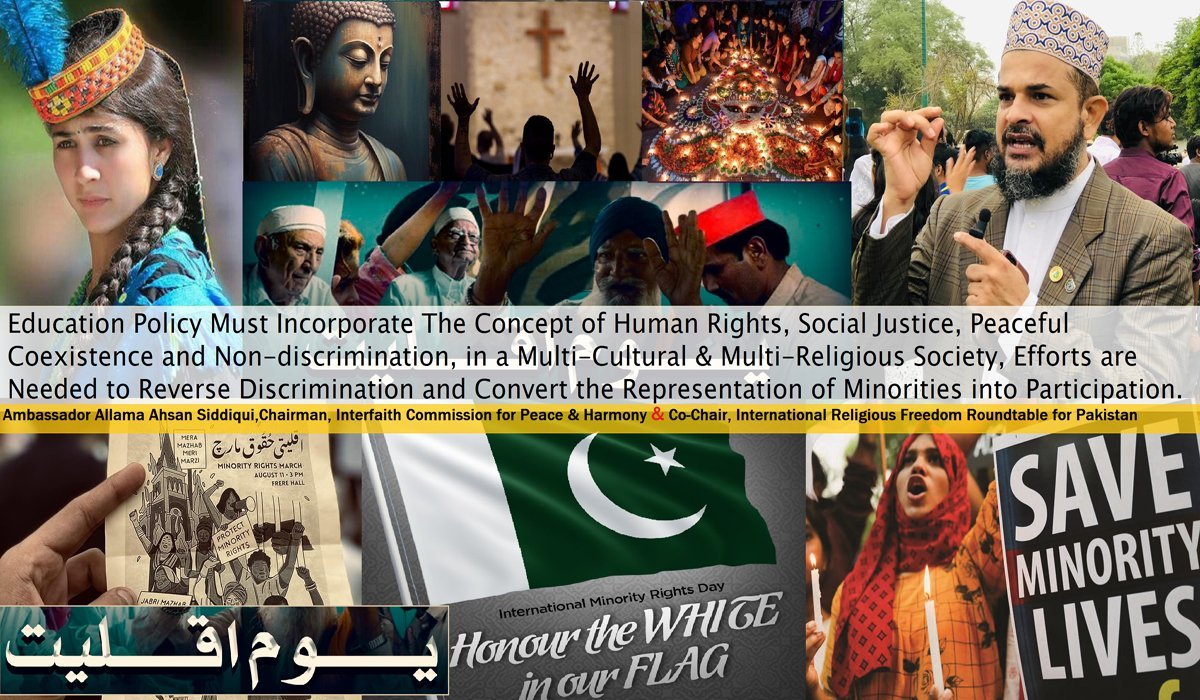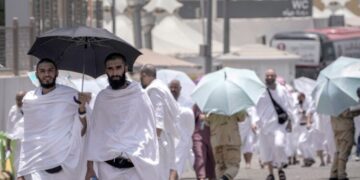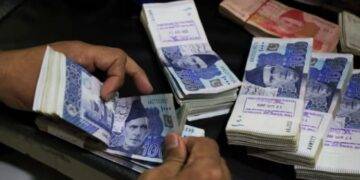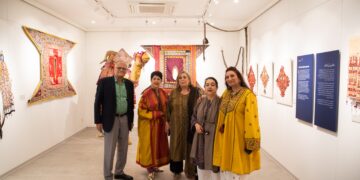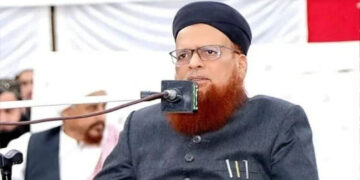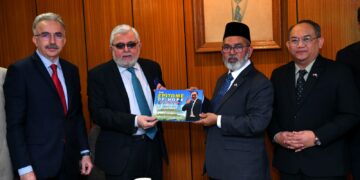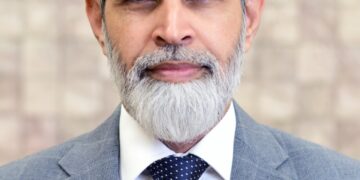KARACHI : The minorities in Pakistan are free to practice their religion. Islam teaches that adherents of all religions should be treated equally. People of all religions desired to live in peace and harmony, whether they were Christians, Hindus, Sikhs, Parsi, or Muslims. Nobody should oppress, treat unfairly, violate another person’s rights, or forcibly convert someone to a different faith. No other faith, including Islam, permits this. Religious minorities community made significant contributions to defence and education.
On the occasion of National Minority Day, Ambassador Imam Allama Muhammad Ahsan Siddiqui congratulated the minorities community, also cut a cake and talking with media the Minority Rights March, on the event of Minority march attended along with Interfaith Commission for Peace & Harmony (#ICPH) and International Religious Freedom Roundtable for Pakistan team and leadership at Frere Hall Karachi. Ambassador Imam Allama Muhammad Ahsan Siddiqui said National Minorities Day is the time to remember the contribution and sacrifices made by the minorities in the creation of Pakistan and their role in Nation building. Non-Muslim communities are an essential part of our national fabric. Non-Muslim communities are the equally true essence of Pakistan and we need to protect their rights. Islam teaches that adherents of all religions should be treated equally. Imam Allama Ahsan Siddiqui said Islam has given universal message of peace and harmony and it respects all other religions, protects religious freedom and ensures security of all religious communities,” Allama Siddiqui said, adding: “Pakistan is the only country where people from different religions live in peace and harmony, credit of which goes to government, religious scholars and leaders of all schools of thought. it is the responsibility of the state to ensure protection and safety to minorities living in an Islamic country and Non Muslim Pakistanis should not feel threatened from any individual, organization and specific community as Islam is guarantor.
Ambassador Imam Allama Muhammad Ahsan Siddiqui said Islam and the Constitution of Pakistan are guarantor of the rights of the minority communities in Pakistan. People of all religions desired to live in peace and harmony, whether they were Christians, Hindus, Sikhs, Parsi, or Muslims. He said that the they have equal rights, adding that establishment of a prosperous and peace-loving society is impossible without their contributions and role. Minorities played a very important role in creation of Pakistan but unfortunately the current circumstances were clearly contrary to the ideas of Quaid e Azam. We salute our non– Muslim brothers and sisters for their contributions, services, sacrifices for nation building.
Ambassador Imam Allama Muhammad Ahsan Siddiqui said that the constitution of Pakistan guarantees equal rights and proportional representation in elected institutions to minority communities for ensuring the protection of their rights. At the same time other demands of the minority community need to be looked at with urgency. The most pressing issue is the forceful conversion of Hindu girls and their marriage to Muslim men. This is an practice that continues to bring a bad name to the country and causes much scare in the religious minority. Hundreds of girls have fallen victim to this practice. Certain problems exist in every society but we as a nation have to face those problems together, we need to put an end to it.






Imam Allama Muhammad Ahsan Siddiqui Ambassador at Large for Global Peace & Human Rights said that Article 20 of the Constitution of Pakistan, 1973, grants every citizen the freedom to profess and practice their choice of religion. He said that Nobody should oppress, treat unfairly, violate another person’s rights, or forcibly convert someone to a different faith. No other faith, including Islam, permits this. We demand an end to systematic oppression, discrimination, marginalization and violence against religious minorities. He said the rights of non-Muslims are sacrosanct and protected. He said that the 11th of August is celebrated as the day of the non-Muslim minority communities to acknowledge their role and thank them for their service towards the country. He said that Islam teaches tolerance and equality while extremism is the approach of a few self-serving people. the entire nation has to stand united against the extremist approaches as those elements were harming the peaceful perception of the country. he said adding that some elements try to misuse religious cards to achieve their personal interests or for political gains but such elements should not only be condemned but also identified and brought to justice.
Allama Muhammad Ahsan Siddiqui said that the Quaid-i-Azam Muhammad Ali Jinnah delivered a landmark speech in the Constituent Assembly on April 11, 1947 in which he gave a commitment that all citizens living in the state of Pakistan have equal rights and obligations without any discrimination and especially the freedoms and rights of non-Muslims are protected. We want Pakistan to move ahead in accordance with the thoughts and teachings of Quaid-e-Azam and Allama Muhammad Iqbal who advocated for peace and harmony among all religions. Minorities community made significant contributions to defence education and others. He said that there was unprecedented interfaith harmony in Pakistan and there was no coercion or intimidation over them while across the border in India, minority communities were unsafe and under oppression. He said that this day renews the commitment to the protection of minorities and national harmony among different religions. Quaid-e-Azam gave this vision in his historic address on 11 August 1947, which is included in the 1973 constitution, in which minorities are allowed to practice their religion and culture freely. He said that he was inspired by the vision of Quaid-e-Azam. This National Minority Day August 11 is a day to reaffirm the commitment to protect the rights of all citizens and treat them equally regardless of religion, caste or race.
The International Religious Freedom Roundtable for Pakistan Co-Chair, Allama Muhammad Ahsan Siddiqui said that non-Muslims took active part in the freedom struggle, recalling that it was Dewan Bahadur S.P. Sangha, who as Speaker of the Punjab Assembly, exercised a casting vote in favour of Pakistan. He said that whether it is judiciary, civil services or defence, there is no walk of national life in which non-Muslim citizens are not contributing. He said that we are one nation under the flag of Pakistan and vow to continue to serve the motherland, no matter who we are. He said that while some people have hijacked religious freedom in the country, the Interfaith Commission for Peace & Harmony (ICPH) and International Religious Freedom Roundtable for Pakistan (IRF Pakistan) is committed towards bringing all citizens on one platform.
Interfaith Commission for Peace & Harmony (ICPH) and International Religious Freedom Roundtable for Pakistan always stands for rights and protects non -muslim within our non-muslim communities in Pakistan. ICPH will never allow any kind of discrimination against non-Muslim communities. He said that the ICPH has always adopted a clear and manifest stance on the excesses committed against the minorities devoid of any ambiguity and sided with them during these times.
The Interfaith Commission for Peace & Harmony (ICPH) and International Religious Freedom Roundtable for Pakistan (IRF Pakistan) was determined to ensure the rights and protection of minority communities according to the law of the land and taking every possible step for resolving their issues.
The Interfaith Commission for Peace & Harmony (ICPH) would protect rights of people from all religious minorities including Christians, Sikhs, Hindus and Parsi , while providing a secure environment for everyone.
Let us protect the future of this country by protecting the rights of the non-Muslims. Let’s celebrate diversity, equality, and unity as we raise our voices for a more inclusive society. Let us work for the establishment of a tolerant, inclusive and welfare-based society.


